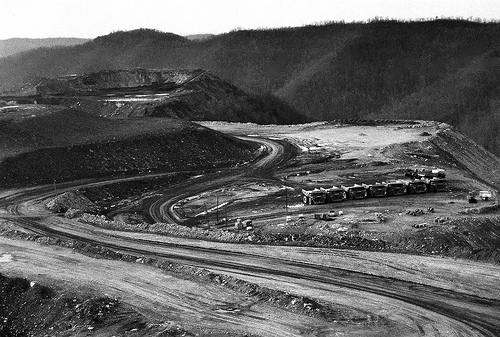Weighing the long-term implications of mountaintop removal mining
 The practice of mountaintop removal mining has spurred a great deal of research and policy debate since January of this year, when the Environmental Protection Agency (EPA) vetoed a federal permit for the 2,278 acre Spruce No. 1 mine in Logan County, West Virginia. The veto of the permit was EPA’s 13th use of its veto authority, granted under the Clean Water Act (Public Law 92-500).
The practice of mountaintop removal mining has spurred a great deal of research and policy debate since January of this year, when the Environmental Protection Agency (EPA) vetoed a federal permit for the 2,278 acre Spruce No. 1 mine in Logan County, West Virginia. The veto of the permit was EPA’s 13th use of its veto authority, granted under the Clean Water Act (Public Law 92-500).
In the practice of mountaintop removal mining, upper elevation forests are cleared and stripped of topsoil and explosives are used to break up rocks to access buried coal. Excess rock (“mine spoil”) is pushed into adjacent valleys where it buries existing streams.
Surface mining is currently the dominant driver of land-use change in the Appalachian region. Industry advocates and regional lawmakers describe the practice as having important economic benefits for the region. At the same time, a great deal of scientific research has called into question whether the long-term ecological and human health consequences of mountain top removal mining outweigh the short-term economic benefits.
A recent study by West Virginia University and Washington State University scientists found a correlation between areas of mountain top removal mining and birth defects of local residents. The researchers used government data on almost two million birth records from mining sites in Kentucky, Tennessee, Virginia and West Virginia. The study notes that, even after accounting for socioeconomic risks, the correlation persists—making it increasingly likely that water and air pollution were dominant factors. The study specifically found that areas with the most substantial environmental disturbances corresponded with the greatest incidents of birth defects. The study does concede a number of other factors may play a role, such as underreporting of maternal smoking and drinking.
In May, EPA also released two studies on the effects of mountain top removal mining in Appalachian states. The first study found that streams were “permanently lost with the removal of the mountain and from burial under mining waste.” It also found increased levels of selenium and other pollutants near mining sites that can have detrimental impacts on wildlife in the area. The second study, focusing on water conductivity, found that high levels of conductivity are associated with a loss of aquatic life.
On Capitol Hill, EPA’s veto has been met with sharp criticism among senior congressional Republicans, the mining industry and West Virginia lawmakers (among both political parties). Mining advocates claim EPA’s actions serve to stifle job creation in the region amidst an already fragile economy. Both of the West Virginia Senators, Joe Manchin (D) and Jay Rockefeller (D) are opposed to EPA’s action—the latter having sent a letter to the President criticizing the move.
In the U.S. House of Representatives, there have several attempts to curb EPA’s move. The Fiscal Year 2012 Interior, Environment and Related Agencies Appropriations Act included language to stop implementation of an agreement between EPA and the Army Corps of Engineers, which set aside some coal mining permits for “enhanced review.” It would also block funding for implementation of the EPA draft guidance that seeks to prevent water contamination from Appalachian mountaintop removal mining.
House Transportation and Infrastructure Committee Chairman John Mica (R-FL) and Ranking Member Nick Rahall (D-WV) also spearheaded H.R. 2018, the Clean Water Cooperative Federalism Act. The bill would shift regulatory authority over water and wetlands from EPA to the states, effectively prohibiting the agency from overruling state water quality standards and rulemakings. The House passed the bill July 13 by a vote of 239-184, but it is not expected to pass the Senate and would be vetoed by President Obama.
Perhaps the solution in finding common ground lies in the implementation of a balanced approach where mining practices are informed by science. In the most recent addition of the Ecologist Goes to Washington podcast, Graduate Student Policy Award winner Michael Levy talks about his work researching the ecological implications of mountaintop removal mining.
Levy advocates for environmentally-sensitive mining practices that are informed by science, noting that, even when best practices are implemented, there is never a complete ecosystem restoration. Levy simultaneously advocates precautionary thinking when implementing mining policies in light of this.
As Levy expounds in the podcast, the environmental and health implications will be felt for generations to come; therefore, it is important that policymakers give equal weight to both the real and potential long-term consequences of such mining. That is, account for the costs of environmental impacts and public health consequences, in addition to the economic benefits.
Photo Credit: Rachel Molenda